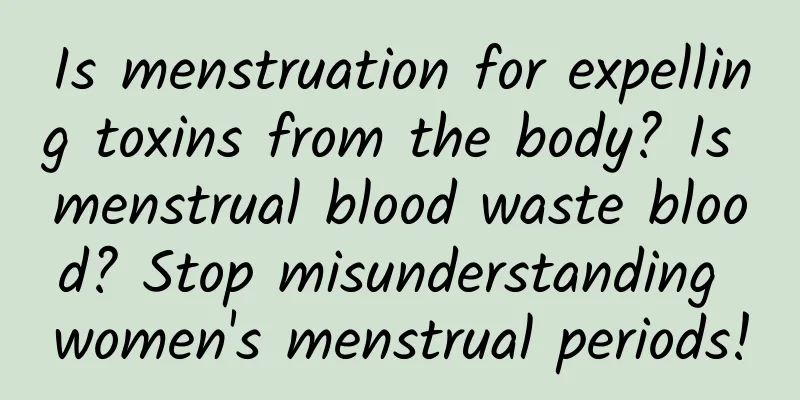Is menstruation for expelling toxins from the body? Is menstrual blood waste blood? Stop misunderstanding women's menstrual periods!

|
gossip I believe you have seen this statement on many marketing accounts: Women's menstruation is actually a periodic excretion of toxins from the body, so menstrual blood is waste blood. And not having a period means that you may be sick because the body has lost its normal detoxification function. This statement is also the consensus of many people. In some remote villages, women during their menstrual period will be restricted from participating in various important activities. The reason is not that it is inconvenient for them, but that the waste blood discharged during menstruation will cause harm. But what is the actual situation? Is menstruation really a way to detoxify? Is menstrual blood really just waste blood full of toxins? Copyrighted stock images, no reproduction is authorized analyze Where does menstrual blood come from? As early as the 1950s, some people put forward the concept of "menstrual toxins", but the conclusion process was extremely arbitrary: scientists at Harvard University injected women's menstrual blood into animals, and after a period of time, some animals died, so they concluded that menstrual blood contained toxins. Some scholars pointed out that this experiment lacks comparative evidence, which is likely due to the fact that the blood samples carry bacteria and other contaminants. Most importantly, animals also have blood types, and compared with humans, the types are complex and unstable. For example, dogs also have 8-13 blood types, and if the wrong blood is transfused, it will also cause blood hemolysis problems. In fact, menstrual blood is far less scary. Starting from puberty, the female reproductive system will continue to mature. During the menstrual cycle, the ovaries will release eggs and secrete enough estrogen and progesterone to thicken the endometrium from thin to thick, creating a fertile soil for the future fertilized eggs to survive. After the egg is released, if it combines with the sperm, it will come to the endometrium to nurture the fertilized egg. But if the egg is not fertilized, the endometrium, which has thickened but has no place to be used, will necrotize and fall off, causing bleeding. This blood is discharged from the uterine cavity and then flows out of the vagina, which is the origin of menstrual blood. Menstrual blood contains three-quarters of arterial blood and one-quarter of venous blood. These bloods do not flow alone in a small range, just like other blood in the human body. Therefore, the saying that menstrual blood is waste blood is simply nonsense. At the same time, menstruation has nothing to do with detoxification. After all, along with menstrual blood, small pieces of flesh shed from the endometrium are also discharged. The endometrium is exactly where the fertilized egg is nurtured. If this place is poisonous, it would be really unfair. Copyrighted stock images, no reproduction is authorized Does not having menstruation mean you are unhealthy? On many platforms, the saying that " good qi and blood means heavy menstrual volume, and also means good health " is very popular. In fact, there is no scientific conclusion. After all, we have argued that menstruation is not equal to detoxification, and menstrual blood is not waste blood, but healthy blood in the human body. If the menstrual flow is too much, it may cause anemia and low immunity. On the contrary, excessive menstrual flow may be the result of problems such as uterine fibroids or endometrial polyps, or it may be an abnormal coagulation mechanism that leads to increased menstruation. You need to pay close attention and see a doctor to confirm the situation so that the right medicine can be prescribed. The amount of menstrual blood also varies from person to person, usually between 50 ml and 80 ml. The unified standard of my country and the International Federation of Gynecology and Obstetrics (FIGO) is that menstrual flow less than 5 ml is considered oligomenorrhea. There is also a theory on the Internet: a 7-day period is much better than a 3-day period. Some people think that a short period means a long cycle, and the ovulation time will be relatively longer, which means that women with a 3-day period will ovulate more eggs, and eggs are limited, so women with a short period will experience early menopause and even premature aging. In fact, there is no necessary connection between the above inferences and conclusions. As long as the menstrual period lasts 2-8 days, it is normal. Although women have a limited number of eggs in their lifetime, the number of ovulations is not fixed for each person. It is related to the cell aggregates in the ovaries - the follicles. Every month, the ovaries of healthy women will adjust according to the base number of follicles, and choose to develop 3-11 follicles. Each follicle contains an oocyte, which is the prototype of the egg. After growing, the best-developed follicle will release the egg, and the others will naturally degenerate. (Click to view previous articles: 42-year-old woman with cliff-like aging diagnosed with premature ovarian failure? Will menopausal women age rapidly? The truth →) What we really need to pay attention to, besides the duration of the period and the amount of flow, is actually the menstrual cycle. Generally speaking, the menstrual cycle is about 28 days (calculated based on the interval between the last menstrual period and the first menstrual bleeding of the next period). As long as it is advanced or delayed by less than a week, it is within the regular range. If the cycle is too short, less than 21 days, there may be a problem with secretion, such as ovulation disorder or luteal insufficiency. If the cycle is too long, more than 35 days, there may be a problem with the ovaries, perhaps premature ovarian failure, polycystic ovary syndrome and other diseases. Copyrighted stock images, no reproduction is authorized Can menstruation be held back? A few days ago, the topic of "high-speed rail selling sanitary napkins" became a hot search topic, and netizens praised that women's physiological demands have finally been recognized, which is obviously a great progress. However, many people who claim to be women say that sanitary napkins are not a necessity, because in their past experience, menstruation is like urination and defecation, which can be "held back". I don't want to speculate on the intention of the above remarks. After all, the world is so big that there may be individual cases. But I want to emphasize that for every woman with a normal body structure, menstruation is not like shit, urine, or farts that can be endured if you want. The reason why people can resist the urge to defecate in important occasions or when they cannot find a toilet is that the urine excretion channel - the urethra and the feces and fart excretion channel - the anus, both have sphincters. The sphincter is a type of muscle, a circular muscle, commonly found in the human digestive tract and urinary system. It maintains the normal function of the human body through contraction and relaxation. Normally, it is in a contracted state. In simple terms, it is like a valve that can be controlled by humans, opening and closing according to needs. For example, patients with incontinence actually have sphincters that have lost their normal functions for various reasons and no longer obey human commands. When women have their periods, the menstrual blood is discharged from the vagina, which does not have a sphincter muscle, which means that there is no way to close the " valve " at will . Just like a cut on the arm, the blood will flow out naturally, regardless of the person's will. If you can hold back the bleeding like holding back urine, it will solve a lot of medical problems. However, I would like to remind readers that although you can hold back your urine and feces, it is better to let them flow freely unless you have to. Holding back urine and feces for a long time can cause great harm to the body. Urine is actually produced by the kidneys constantly filtering waste from the blood. It flows through the ureters and eventually collects in the bladder. However, if you hold your urine for a long time, the bladder will lose its elasticity, resulting in incomplete urination. In addition, if the urine is squeezed too much and exceeds the maximum carrying capacity of the bladder, it will be blocked in the ureter, causing the urine to return to the kidneys, causing water accumulation and destroying the original function. Similarly, the feces that are held back will also return from the rectum to the previous link: the sigmoid colon. During this process, the feces will produce a large amount of harmful substances such as ammonia and sulfide in the body, which will be absorbed by the organs along with water, eventually inducing a variety of disease risks. In view of this, people who have never had their periods should not easily teach women to hold back their periods. Firstly, this is too idealistic. From a physiological point of view, it is impossible to hold back their periods. Secondly, "holding back" is not a very healthy practice. Copyrighted stock images, no reproduction is authorized Topics related to menstruation have sparked discussions on the Internet many times. Many people believe that menstruation existed before the invention of sanitary napkins, and the older generation of women have adapted to it, so why can't the new generation of women? But in fact, the older generation of women did not adapt, but silently endured the pain under the oppression of the environment. The older generation of women would use plant ash or repeatedly used cotton cloth as sanitary napkins, which actually greatly damaged their health. To this day, many women still face difficulties with menstruation, a normal physiological phenomenon. According to a 2020 survey by the International Federation of Gynecology and Obstetrics, about 500 million women around the world are trapped in menstrual poverty and cannot afford proper sanitary napkins. Menstruation is only a result, but its source is the basis for the survival of the original form of human beings. Every normal person who is not born from a test tube but is nurtured in the womb for ten months should face up to and respect its existence. Female readers can forward this article to the male friends around you. After all, they don’t feel the same way and rarely take the initiative to learn about it. Male readers who are interested can search for more information based on this article. A small change may bring unexpected good deeds to the gender that makes up half of the world’s population. Change starts now. in conclusion 1. Menstruation is just a manifestation of the normal functioning of the female reproductive system. It is a normal physiological phenomenon, not detoxification. 2. There is not much difference between menstrual blood and blood from other parts of the human body, so it is nonsense to say that it contains toxins. 3. The menstrual cycle, duration of the period, and amount of menstrual blood flow vary from person to person. As long as they are within a fixed range, they are considered normal and are not necessarily related to early menopause or premature aging. 4. Menstrual blood flows out of the vagina and cannot be "held back" like urine and feces. References: [1]Women's Gynecologic Health. Jones & Bartlett Publishers. 2011: 94 [2015-07-13]. ISBN 9780763756376. [2]Menstruation and the menstrual cycle fact sheet. Office of Women's Health. December 23, 2014 [25 June 2015]. [3] Widmaier, Eric P.; Raff, Hershel; Strang, Kevin T. Vander's Human Physiology: The Mechanism of Body Function 12th. New York, NY: McGrawHill. 2010: 555–631. ISBN 0-077-35001-4. [4]Vander, Arthur; Sherman, James; Luciano, Dorothy (1994). Human Physiology: The Mechanism of Body Function (Sixth Edition, International ed.). McGraw Hill, Inc. pp. 437–440. ISBN 0-07-113761-0. [5]What Is the Point of a Period? retrieved from https://www.scientificamerican.com/article/what-is-the-point-of-a-period/# [6]Month After Month: Period Poverty retrieved from https://www.figo.org/search/node?keys=period+poverty&advanced-form=1&f%5B0%5D=language%3Aen [7] Life Times: Filling the gap! New domestic research reveals how dangerous “irregular menstruation” is. [8] Zhang Zhichao. Six diseases caused by holding back [J]. Public Health, 2012(1):1. Author: Wu Zhaodi, popular science creator Reviewer: Tang Qin, Director of the Science Popularization Department of the Chinese Medical Association Planning丨Yang Yaping Editor|Li Mengxin |
<<: Genetic lottery! Pear-shaped sisters stand up, these benefits you dare not think about
>>: The fifth one belongs to China, it will depart in 2025, with the goal of shocking the sky!
Recommend
Is eating late night snacks addictive? How to eat to satisfy your cravings and stay healthy
Beer, kebabs, crayfish... Does it sound like you’...
Microsoft showcases HoloLens holographic glasses at its flagship store in New York
Starting today, the HoloLens experience display s...
With the help of a series of "evidence", he "solved" the biological "mass murder" 252 million years ago
The mass extinction event during the Permian peri...
Is product homogeneity serious? 4 dimensions to teach you how to break through successfully!
If you are a company that produces cosmetic conta...
One article to understand Toutiao advertising placement
" Toutiao " is a personalized recommend...
Private Domain Traffic: The Secret to Transaction in Moments
The Internet traffic dividend has reached its pea...
Eating the wrong snacks may harm your health! If you are hungry, why not eat these...
Expert in this article: Wang Silu, National Senio...
The domineering "little trumpet": The beautiful morning glory is actually a "foreigner"?
Speaking of invasive alien species, the most well...
QQ Members’ 20th Anniversary New Feature “Energy Value” Launched: See How Much Your QQ Is Worth
QQ Member was born in 2000. On its 20th anniversa...
Once in a thousand years! The brightest gamma-ray burst to date, how did the "Insight" and "Jimu" jointly capture it?
At 2 a.m. on March 29, scientists from China, the...
What happened when Beijing issued the blue high temperature warning signal? What is the high temperature in Beijing?
Beijing issues blue warning for high temperature ...
Niuqi Academy - A guide for brands to make money on Xiaohongshu, a guide for brands to create hits on Xiaohongshu with annual sales of tens of millions
Niuqi Academy - Brand Xiaohongshu Gold Digging Gu...
How to make information flow video ads more efficient?
Some advertisers have already reaped the benefits...
Drinking less alcohol can reduce harm? Many people don’t know this…
Reviewer of this article: Chen Haixu, Deputy Dire...
What will happen to the new energy vehicle market if the huge subsidies disappear?
Last year, one out of every two electric cars sol...









